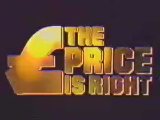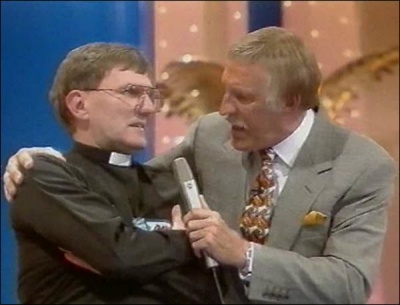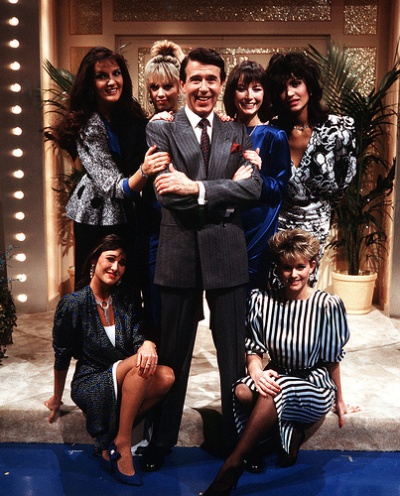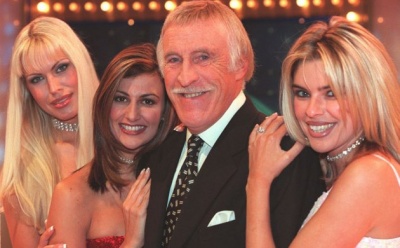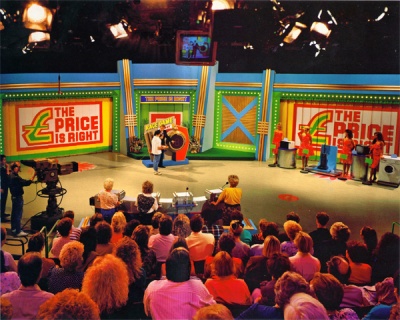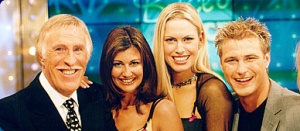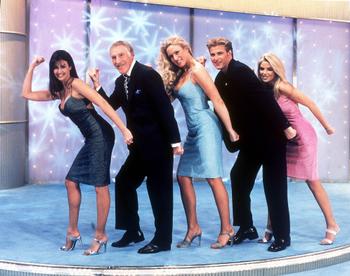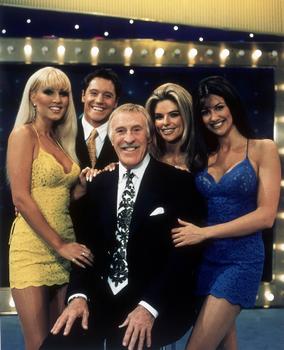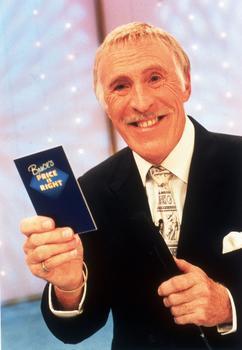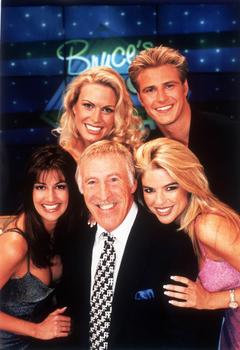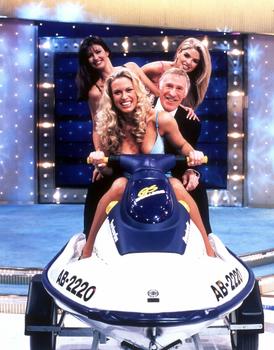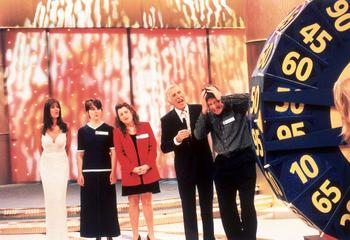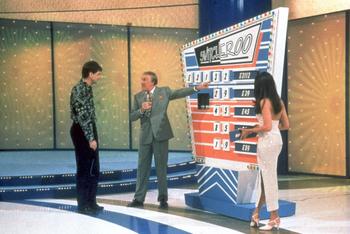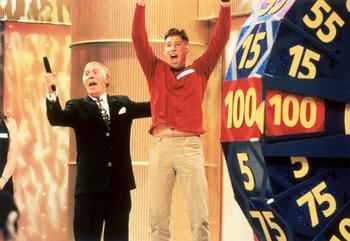The Price is Right
(→Broadcast) |
(→Theme music: Lawrence Oakley did the full score for Joe's version (hence his plain "Music" credit). Nothing imported from the other side of the Atlantic this time - not even the "losing horns") |
||
| (42 intermediate revisions not shown) | |||
| Line 7: | Line 7: | ||
[[Joe Brown]] (non-broadcast pilot) | [[Joe Brown]] (non-broadcast pilot) | ||
| - | [[Leslie Crowther]] (1984- | + | [[Leslie Crowther]] (1984-88) |
[[Bob Warman]] (1989-90) | [[Bob Warman]] (1989-90) | ||
| Line 15: | Line 15: | ||
[[Ant McPartlin|Ant]] & [[Declan Donnelly|Dec]] (2005 special) | [[Ant McPartlin|Ant]] & [[Declan Donnelly|Dec]] (2005 special) | ||
| - | [[Joe Pasquale]] (2006- | + | [[Joe Pasquale]] (2006-07) |
[[Vernon Kay]] (2007 special) | [[Vernon Kay]] (2007 special) | ||
| - | [[Alan Carr]] (2017) | + | [[Alan Carr]] (2017, 2020-21 specials) |
== Co-hosts == | == Co-hosts == | ||
Announcers:<br> | Announcers:<br> | ||
| - | Simon Prebble (1984- | + | Simon Prebble (1984-88)<br> |
[[Bobby Bragg]] (1989: early shows)<br> | [[Bobby Bragg]] (1989: early shows)<br> | ||
Allan Sherwin (1989-90: later shows)<br> | Allan Sherwin (1989-90: later shows)<br> | ||
| - | [[Peter Dickson]] (1995-2001, 2005, 2006- | + | [[Peter Dickson]] (1995-2001, 2005, 2006-07)<br> |
| - | Mike Hurley (2006- | + | Mike Hurley (2006-07)<br> |
| + | Tony Hirst (2017 special)<br> | ||
| + | [[John Sachs]] (2020-21 specials) | ||
| - | ''' | + | '''Models:<br>''' |
| - | Denise Kelly (1984- | + | Denise Kelly (1984-88)<br> |
| - | Marie-Elise Grepne (1984- | + | Marie-Elise Grepne (1984-85)<br> |
| - | Jacqueline Bucknell (1984- | + | Jacqueline Bucknell (1984-86)<br> |
| - | Julia Roberts (1984- | + | Julia Roberts (1984-86)<br> |
Sandra Easby (1985)<br> | Sandra Easby (1985)<br> | ||
Cindy Day (1986-8)<br> | Cindy Day (1986-8)<br> | ||
| - | Carol Greenwood (1986- | + | Carol Greenwood (1986-88)<br> |
| - | Gillian de Terville (1986- | + | Gillian de Terville (1986-88)<br> |
| - | Judy Bailey (1986- | + | Judy Bailey (1986-88)<br> |
Elsa O'Toole (1986)<br> | Elsa O'Toole (1986)<br> | ||
| - | Laura Calland (1987- | + | Laura Calland (1987-88)<br> |
Sarah Wynter (1988)<br> | Sarah Wynter (1988)<br> | ||
Suzie Marlowe (1989-90)<br> | Suzie Marlowe (1989-90)<br> | ||
| Line 50: | Line 52: | ||
Kimberley Cowell (1995-2001)<br> | Kimberley Cowell (1995-2001)<br> | ||
Emma Steadman (1995-2001)<br> | Emma Steadman (1995-2001)<br> | ||
| - | Emma Noble (1995- | + | Emma Noble (1995-97)<br> |
| + | Brian Tattersall (1995-97)<br> | ||
Lea Kristensen (1998-2001)<br> | Lea Kristensen (1998-2001)<br> | ||
| - | |||
| - | |||
| - | |||
| - | |||
| - | |||
| - | |||
Simon Peat (1998-2001)<br> | Simon Peat (1998-2001)<br> | ||
| - | Richard Kyte (2006- | + | Natalie Denning (2006-07)<br> |
| - | Ray Tizzard (as Raynard) (2006- | + | Richard Kyte (2006-07)<br> |
| + | Amanda Robbins (2006-07)<br> | ||
| + | Natalie Pike (2006-07, [[Beauty and the Geek]] contestant)<br> | ||
| + | Ray Tizzard (as Raynard) (2006-07)<br> | ||
| + | Nichola Dixon (2017 special)<br> | ||
| + | Dorretta Maynard (2017 special)<br> | ||
| + | Zoe Nicholas (2017 special)<br> | ||
| + | Matt Peacock (2020-21 specials)<br> | ||
| + | Rachel Trevaskis (2020-21 specials)<br> | ||
| + | Kimberley Williams (2020)<br> | ||
| + | Nicole Bailey (2021 specials) | ||
== Broadcast == | == Broadcast == | ||
| Line 74: | Line 81: | ||
Yorkshire Television and Fremantle (UK) Productions (formerly Talbot Television) for ITV, 4 September 1995 to 15 January 1999 (68 episodes in 4 series) | Yorkshire Television and Fremantle (UK) Productions (formerly Talbot Television) for ITV, 4 September 1995 to 15 January 1999 (68 episodes in 4 series) | ||
| - | Yorkshire Television and Grundy for ITV, 10 September 1999 to 16 December 2001 (48 episodes in 3 series + 3 unaired) | + | Yorkshire Television and Grundy for ITV, 10 September 1999 to 16 December 2001 (48 episodes in 3 series + 3 unaired by original network) |
| + | |||
| + | Challenge, 2002 (last 3 episodes - see [[#Trivia|Trivia]] below) | ||
Granada and Thames for ITV1, 17 September 2005 (''[[Gameshow Marathon]]'' one-off) | Granada and Thames for ITV1, 17 September 2005 (''[[Gameshow Marathon]]'' one-off) | ||
| Line 83: | Line 92: | ||
Thames for Channel 4, 30 December 2017 | Thames for Channel 4, 30 December 2017 | ||
| + | |||
| + | Talkback for ITV, 6 June and 24 December 2020, 17 April and 23 December 2021 (''[[Epic Gameshow]]'' episodes) | ||
</div> | </div> | ||
| Line 120: | Line 131: | ||
The other bit you watched The Price Is Right for was the games, of which there were a massive amount. If some of them were a bit dull - "do you want to swap these prices over or not?" was a low point - others were fantastic. The game that scared us most when we were younger was '''Cliffhanger''', where for every pound the contestant was out in their guess, a little man would climb a mountain, yodelling all the way, until falling to his death off the top after 25 steps - one step for each £1 you were out on three different pricing items. | The other bit you watched The Price Is Right for was the games, of which there were a massive amount. If some of them were a bit dull - "do you want to swap these prices over or not?" was a low point - others were fantastic. The game that scared us most when we were younger was '''Cliffhanger''', where for every pound the contestant was out in their guess, a little man would climb a mountain, yodelling all the way, until falling to his death off the top after 25 steps - one step for each £1 you were out on three different pricing items. | ||
| - | <div class="image"><IMG src="/atoz/programmes/p/price_is_right/priceisright1.jpg" alt="priceisright1.jpg" width="142 | + | <div class="image"><IMG src="/atoz/programmes/p/price_is_right/priceisright1.jpg" alt="priceisright1.jpg" width="142" height="200"><IMG src="/atoz/programmes/p/price_is_right/priceisright2.jpg" alt="priceisright2.jpg" width="153" height="200"> |
''Games from the original Crowther version''</div> | ''Games from the original Crowther version''</div> | ||
| - | The most fun ones were the ones that involved a little bit more than just pricing, such as '''Hole in One''' where to win the big prize the player had to putt a golf ball into the hole but for every item he/she priced correctly the player could putt from closer. Every week this came up there was always a bet with one of the scantily dressed assistants that ol' Brucie wouldn't be able to putt it in, which he never usually did. Also hilariously, the giant cardboard sign had a handle that changed to 'Hole in Two' so that if the player lost they could have another shot. | + | The most fun ones were the ones that involved a little bit more than just pricing, such as '''Hole in One''' where to win the big prize the player had to putt a golf ball into the hole but for every item he/she priced correctly the player could putt from closer. Every week this came up there was always a bet with one of the scantily dressed assistants that ol' Brucie wouldn't be able to putt it in, which he never usually did. Also, hilariously, the giant cardboard sign had a handle that changed to 'Hole in Two' so that if the player lost they could have another shot. |
<div class="image"><IMG src="/atoz/programmes/p/price_is_right/price2.jpg" alt="price2.jpg" width="175" height="119"> | <div class="image"><IMG src="/atoz/programmes/p/price_is_right/price2.jpg" alt="price2.jpg" width="175" height="119"> | ||
| Line 161: | Line 172: | ||
The Pasquale version was axed in January 2007 due to ratings averaging 800,000 viewers. | The Pasquale version was axed in January 2007 due to ratings averaging 800,000 viewers. | ||
| + | |||
| + | Bizarrely, Channel 4 decided to put together a rather lurid one-off special in 2017, with [[Alan Carr]] in charge. It didn't do too badly, though evidently not well enough for a series commission, plus Tony Hirst really was no [[Peter Dickson]]. It was farcical, then, that when ITV produced a couple of episodes for Alan Carr's [[Epic Gameshow]], that they managed to get Dickson voicing the sponsorship but [[John Sachs]] announcing the episode. | ||
=== Summing up === | === Summing up === | ||
| Line 228: | Line 241: | ||
On the very first ''TPiR'', a woman called Mary Brown was invited to "come on down" but she refused. Producer William G. Stewart wanted to start the new series with a rhyme "Mary Brown, Come on Down!" but clearly it didn't go to plan! | On the very first ''TPiR'', a woman called Mary Brown was invited to "come on down" but she refused. Producer William G. Stewart wanted to start the new series with a rhyme "Mary Brown, Come on Down!" but clearly it didn't go to plan! | ||
| - | In the Crowther era, the winner actually got their name in the end credits. Which was nice. | + | In the Crowther era, the winner actually got their name in the end credits. Which was nice. |
| + | |||
| + | No, the Julia Roberts who co-hosted the first two series is not the American actress of the same name. This one later became one of the launch faces for QVC, along with [[The Weakest Link]] narrator Jon Briggs. | ||
Following [[Leslie Crowther]]'s death in 1996, [[William G. Stewart]] revealed that Crowther had initially been reluctant to shout 'Come on down!' on the show and had said that he'd need to speak to his wife, Jean, first, in case she didn't approve. Somewhat nonplussed, William G said, "But I'm your producer - she's only your wife", to which Crowther immediately responded, "No - she's my wife - you're only my producer!" Fortunately, Jean did eventually approve and Crowther soon made the catchphrase his own. | Following [[Leslie Crowther]]'s death in 1996, [[William G. Stewart]] revealed that Crowther had initially been reluctant to shout 'Come on down!' on the show and had said that he'd need to speak to his wife, Jean, first, in case she didn't approve. Somewhat nonplussed, William G said, "But I'm your producer - she's only your wife", to which Crowther immediately responded, "No - she's my wife - you're only my producer!" Fortunately, Jean did eventually approve and Crowther soon made the catchphrase his own. | ||
| Line 245: | Line 260: | ||
As a rather sad coda to the Pasquale era, studio director Phil Chilvers died mid-way through the production of the series. He was found dead in his hotel room, and the crew and audience of 400 waiting in the studio were sent home. | As a rather sad coda to the Pasquale era, studio director Phil Chilvers died mid-way through the production of the series. He was found dead in his hotel room, and the crew and audience of 400 waiting in the studio were sent home. | ||
| + | |||
| + | The last episode of Bruce's first series had to wait an entire year for transmission on 27 December 1996, which was after the second series had its full run, not only that, their sponsorship in the first series The Sun, was removed for that episode only because of an expired contract. | ||
| + | |||
| + | The final 3 episodes of the Forsyth era were never shown until game show channel Challenge aired them in 2002. | ||
== Merchandise == | == Merchandise == | ||
| Line 251: | Line 270: | ||
A ''Bruce's Price is Right'' board game was made. | A ''Bruce's Price is Right'' board game was made. | ||
| + | |||
| + | == Theme music == | ||
| + | |||
| + | 1984-88: Paul Maguire, credited as "Musical Director". | ||
| + | |||
| + | 1989-90: The original American theme by Edd Kalehoff and Score Productions. Kalehoff's "come on down" music was also used, as were his "losing horns" for lost games and failed showcase bids. | ||
| + | |||
| + | 1995-2001: A saxophone-based arrangement of the Kalehoff theme, also imported from Stateside. The aforementioned "losing horns" were used from 1996 onwards, after a different losing cue was used in 1995. | ||
| + | |||
| + | 2006-07: Lawrence Oakley composed a full score. | ||
| + | |||
| + | The 2017 version used a new score, composed by Dan McGrath and Josh Phillips. | ||
== Web links == | == Web links == | ||
| Line 280: | Line 311: | ||
== See also == | == See also == | ||
| - | Weaver's Week reviews: the [[Weaver's Week 2006-05-14|2006]] | + | Weaver's Week reviews: the [[Weaver's Week 2006-05-14|2006]] and [[Weaver's Week 2018-01-07|2017]] revivals from the time, and retrospectives of the [[Weaver's Week 2014-02-02#The New Price Is Right|1989]] and [[Weaver's Week 2013-04-28|1984]] versions. |
== Videos == | == Videos == | ||
| - | <div class="video"><object width="480" height="385"><param name="movie" value="http://www.youtube.com/v/ | + | <div class="video"><object width="480" height="385"><param name="movie" value="http://www.youtube.com/v/uQKqY3Izwt0?fs=1&hl=en_US"></param><param name="allowFullScreen" value="true"></param><param name="allowscriptaccess" value="always"></param><embed src="http://www.youtube.com/v/uQKqY3Izwt0?fs=1&hl=en_US" type="application/x-shockwave-flash" allowscriptaccess="always" allowfullscreen="true" width="480" height="385"></embed></object><br/>''The very first episode.''</div> |
[[Category:Lifestyle|Price is Right, The]] | [[Category:Lifestyle|Price is Right, The]] | ||
| Line 291: | Line 322: | ||
[[Category:Central Productions|Price is Right, The]] | [[Category:Central Productions|Price is Right, The]] | ||
[[Category:Grundy Productions|Price is Right, The]] | [[Category:Grundy Productions|Price is Right, The]] | ||
| - | [[Category: | + | [[Category:TalkbackThames Productions|Price is Right, The]] |
[[Category:Thames Productions|Price is Right, The]] | [[Category:Thames Productions|Price is Right, The]] | ||
[[Category:Yorkshire TV Productions|Price is Right, The]] | [[Category:Yorkshire TV Productions|Price is Right, The]] | ||
| + | [[Category:Challenge Programmes|Price is Right, The]] | ||
[[Category:Channel 4 Programmes|Price is Right, The]] | [[Category:Channel 4 Programmes|Price is Right, The]] | ||
Current revision as of 23:27, 18 December 2024
Contents |
Host
Joe Brown (non-broadcast pilot)
Leslie Crowther (1984-88)
Bob Warman (1989-90)
Bruce Forsyth (1995-2001)
Joe Pasquale (2006-07)
Vernon Kay (2007 special)
Alan Carr (2017, 2020-21 specials)
Co-hosts
Announcers:
Simon Prebble (1984-88)
Bobby Bragg (1989: early shows)
Allan Sherwin (1989-90: later shows)
Peter Dickson (1995-2001, 2005, 2006-07)
Mike Hurley (2006-07)
Tony Hirst (2017 special)
John Sachs (2020-21 specials)
Models:
Denise Kelly (1984-88)
Marie-Elise Grepne (1984-85)
Jacqueline Bucknell (1984-86)
Julia Roberts (1984-86)
Sandra Easby (1985)
Cindy Day (1986-8)
Carol Greenwood (1986-88)
Gillian de Terville (1986-88)
Judy Bailey (1986-88)
Elsa O'Toole (1986)
Laura Calland (1987-88)
Sarah Wynter (1988)
Suzie Marlowe (1989-90)
Tracie Williams (1989-90)
Katrina Maltby (1989-90)
Julie Broster (1989-90)
Peitra Caston (1989-90)
Kimberley Cowell (1995-2001)
Emma Steadman (1995-2001)
Emma Noble (1995-97)
Brian Tattersall (1995-97)
Lea Kristensen (1998-2001)
Simon Peat (1998-2001)
Natalie Denning (2006-07)
Richard Kyte (2006-07)
Amanda Robbins (2006-07)
Natalie Pike (2006-07, Beauty and the Geek contestant)
Ray Tizzard (as Raynard) (2006-07)
Nichola Dixon (2017 special)
Dorretta Maynard (2017 special)
Zoe Nicholas (2017 special)
Matt Peacock (2020-21 specials)
Rachel Trevaskis (2020-21 specials)
Kimberley Williams (2020)
Nicole Bailey (2021 specials)
Broadcast
Central in association with Mark Goodson Productions and Talbot Television for ITV, 24 March 1984 to 8 April 1988 (100 episodes in 5 series)
The New Price is Right:
Talbot Telegame and Mark Goodson Productions for Sky One, 4 September 1989 to 31 August 1990
Bruce's Price is Right:
Yorkshire Television and Fremantle (UK) Productions (formerly Talbot Television) for ITV, 4 September 1995 to 15 January 1999 (68 episodes in 4 series)
Yorkshire Television and Grundy for ITV, 10 September 1999 to 16 December 2001 (48 episodes in 3 series + 3 unaired by original network)
Challenge, 2002 (last 3 episodes - see Trivia below)
Granada and Thames for ITV1, 17 September 2005 (Gameshow Marathon one-off)
TalkbackThames for ITV1, 8 May 2006 to 12 January 2007 (124 episodes in 1 series)
ITV Productions and TalkbackThames for ITV1, 7 April 2007 (Gameshow Marathon one-off)
Thames for Channel 4, 30 December 2017
Talkback for ITV, 6 June and 24 December 2020, 17 April and 23 December 2021 (Epic Gameshow episodes)
Synopsis
It's often stated as Britain's Biggest Game Show. In what way it was the biggest is unclear. Is it the one with the biggest prizes? No. Biggest audience? No. Biggest set? No. But for sheer cheek and pluck, you'd have to argue that this American classic does have a lot of heart and a big-hearted "anyone can play" attitude.
Contestants Row
Contestants are plucked (seemingly) at random from the audience and take their places in Contestants Row, where they're each invited to guess the price of an object. The one who guesses the nearest goes on to play a pricing game - different every time, but each involves guessing the prices of various objects in some way (actually and rather curiously, there were games in the Crowther run that didn't involve having to know prices at all, such as the luck and memory game Matchmaker). Win or lose, the contestant who played goes onto the next round. Another contestant comes down from the audience to fill the gap and they guess another price, with the nearest going through again. And so on six times (in the original version) or three times (on the revived 30-minute versions). Contestants who made it to Contestants Row in the Crowther years automatically won "an Olympic-style gold medal" and later, a cuddly teddy bear named William.
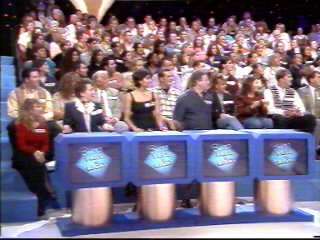 Contestants Row as seen in 1995
Contestants Row as seen in 1995In the original Crowther version, the final six players went to the Supermarket and had to pick items adding up to a particular total, and spin a numbered wheel in the hope of getting 100, with the two nearest going through to the final. If someone managed to get 100 exactly they'd win a bonus prize, such as £1000 in the Forsyth version (although in Warman's episodes they'd need to repeat the feat). The wheel was later removed from the Crowther episodes after the IBA complained about the lack of skill. Instead, all six took part in a quiz on how much things cost in the past (called Check the Difference), with those furthest away eliminated each time.
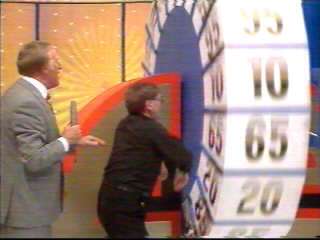 Spinning the wheel
Spinning the wheelThe two surviving contestants each got the Showcase - basically, Big Stack O'Prizes - which they had to calculate the value of, and the one who was nearest won it all. In the nineties version, the wheel was back and only one contestant went through, where they would have to estimate the value of the showcase, and if they got within a specified range they'd win it. In the modern Brucie version, the player got to randomly pick a value between £1000 to £5000 by pressing a button to stop a flashing light on the Range Finder. If they could get their guess to be within that amount of the actual amount, without going over, then they won the whole showcase which was usually between £15-25,000. In these cash-strapped times, Pasquale's version has ranges from £500 to £4000 and the prizes are a step down from the primetime Bruce era.
Prize time
So, what of the prizes? There were Innovations-style gadgets or horrible carriage clocks given away in the first round to whoever got the price right (those who bid about fifty quid in this round clearly didn't want to win them), then in each of the games there'd be loads of household appliances and sometimes even cars and holidays - in some you won a selection of them, in some you won everything on display. Then the showcase at the end would have loads more prizes, normally either the entire contents of a room or a car, holiday and loads of audio-visual stuff. At a time when other quizzes were still giving away sets of luggage, this was a massive deal.
Of course, contestants were simply plucked out of the audience and invited to Come on Down, so you sometimes got a right dozy selection of people there. The producers would bus in whole factories, offices, universities or social clubs en masse, the idea being that the contestants would all have hundreds of supporters behind them, hollering the answers at the top of their voices. In the original version, the contestants got a Price Is Right medal to wear throughout the show, just to congratulate them on successfully negotiating the stairs. The fact the contestants never knew they were going to be on meant that occasionally you'd get people who were completely shocked and hardly said a word throughout the programme. At least it meant the interviews weren't very long.
Glitzy
"Oooh, it's all American isn't it?" With these words, my parents welcomed The Price is Right to Britain. It may seem tame now, but when the show started, nobody had seen anything like it before, such was its brashness and razzle-dazzle. Indeed, they even had to tone it down halfway through the run because it was so incredibly vulgar and over-the-top. Most of this is undoubtedly thanks to original producer William G Stewart, who used to bound through the audience at the start of a show, wearing a pink jumpsuit and playing Land Of Hope And Glory at full blast, just to get the audience wound up. The fact he gave them all party hats and, best of all, Central flags to wave throughout meant that they were excited, even if the viewers weren't. There was also a truly mental vaudeville-esque theme tune which ratcheted up the excitement another notch.
The other bit you watched The Price Is Right for was the games, of which there were a massive amount. If some of them were a bit dull - "do you want to swap these prices over or not?" was a low point - others were fantastic. The game that scared us most when we were younger was Cliffhanger, where for every pound the contestant was out in their guess, a little man would climb a mountain, yodelling all the way, until falling to his death off the top after 25 steps - one step for each £1 you were out on three different pricing items.
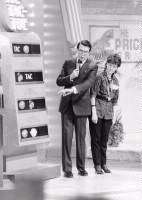
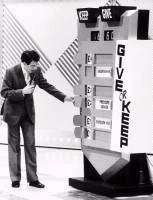 Games from the original Crowther version
Games from the original Crowther versionThe most fun ones were the ones that involved a little bit more than just pricing, such as Hole in One where to win the big prize the player had to putt a golf ball into the hole but for every item he/she priced correctly the player could putt from closer. Every week this came up there was always a bet with one of the scantily dressed assistants that ol' Brucie wouldn't be able to putt it in, which he never usually did. Also, hilariously, the giant cardboard sign had a handle that changed to 'Hole in Two' so that if the player lost they could have another shot.
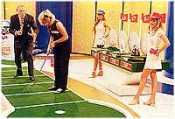 Hole in One in progress
Hole in One in progressAnd then there was Plinko where players dropped discs into holes in the hope that they'd fall into a cash pocket, with more discs going to people who'd guessed prices correctly. There is a gamble at the end where you can choose to risk your prize money (sadly, typically only a few hundred quid) for a 50/50 shot at a larger prize (this was later changed to include the additional chance to double your money). It was also a piece of proverbial to join in with the games at home, and indeed in our attic there are still toys with price labels on from when we played our own versions of Supermarket.
Hosts with the most
Both of the first two hosts worked well - Les had some cracking old-school mannerisms, and at the end of each round he'd tell the contestant to "Go and have a chat with Cindy/Lyndsey/Debbie/etc". Every single time. Brucie, of course, was Brucie and so was always great with the dozy contestants and handling the prop-based games like Plinko. Our favourite thing ever about the show, though, is the way Look-In announced that there would be two more hostesses in one series, to wit "Busy Les will now be assisted by six hostesses rather than four". We just love that "Busy Les". You're working him to the bone, Bill!
Sometimes, if you weren't in the mood for it, The Price Is Right could come across as, well, irritating. This certainly wasn't a show to watch if you had a headache, such was the constant shouting and screaming. It also wasn't the most cerebral of quizzes, with some contestants walking away with stacks of prizes purely through sheer luck. At the time, critics complained about the air of money-grabbing about the show, with losing contestants just slinking off or being forced to stand there like lemons, and the public coming a very poor second to the games and the prizes.
All that really mattered was that they did the games and there were some prizes, and tough tit if the prizes were hugely inappropriate. You sort of felt that if there was only one contestant playing all the games, they wouldn't really notice. Conversely, though, when they dropped Supermarket, the replacement game - "A Mini Mayfair costs £4000, how much did it cost in 1966?" - was actually pretty dull and sedate. Note also the hopeless attempts at making the set look glitzy in the Les version - ie, bunging a few palm trees around the place. The Brucie version was a bit disappointing because you always felt Brucie could do better than shepherding this sort of thing.
For some reason, the members of the audience were always convinced they knew exactly what the price of everything was, so they'd be shouting and making hand signals throughout - even when the options were something like £2501 and £2502, they'd still be hollering at the contestants and groaning when they chose the 'wrong' one. You sort of felt that if they weren't careful, some of the audience would storm the stage and do the games themselves as they didn't think the contestants could be trusted. Sometimes they were right to think that, though - note all the instances in Contestants Row where one wouldn't be listening and so would bid a quid below what someone else had (you can't go over, of course, so they had no chance) or bid insultingly low - where Brucie would always go "Fifty quid!?!" in response. On the Les incarnation, one curious bit was that they'd take the value of the prizes won by the most successful contestant before the final, and then give that amount in cash to 'our nominated charity' - clearly a William G idea to stop people complaining it was soulless.
Channel hopping
The series began on Saturday nights in 1984 and, much to the critics' chagrin, was an enormous hit, instantly making it to number one in the charts with some sixteen million viewers a week. It stayed on Saturday nights for a number of years, and viewing figures were steady throughout, as was the criticism levelled at it, with everyone pointing out that this was the most vulgar, most inane show ever produced and the obvious step towards mass dumbing down. This was never the case, of course, and after a move to Fridays for a bit (the "Busy Les" period), ITV decided to axe it in 1988, presumably figuring that the public could only watch it for so long before becoming thoroughly sick of the whole thing. That said, Les later said that he only knew it had been axed when he read it in the paper, as ITV had neglected to tell him.
In 1989, Talbot Telegame produced a new version of the show, for the embryonic Sky One, using the facilities and services of Central TV. However this was hardly noticed as a) it was on Sky One, and b) Central News' Bob Warman was not really a very inspiring figure as host. The prizes, however, were more expensive than those during the Les period, due to the more relaxed regulation of satellite channels.
Brucie convinced Yorkshire to pick up the rights in 1995, and it was back on ITV, though originally opposite EastEnders and, if anything, even more vulgar and gaudy than the original version (unsurprisingly, it had the same producers as Supermarket Sweep). It did well enough for ITV for the next few years, but often it would turn up in all sorts of weird slots, with odd ones showing up months, or even years, after the series they were actually part of. Eventually endless Emmerdale meant there was no room for quizzes on the channel anymore, so they bunged it out on Saturday teatimes in the middle of summer, much to Brucie's disappointment. They kept it going for a bit, but Brucie's falling out with ITV meant it abruptly finished.
By turns, the Joe Pasquale version is both refreshingly different and slightly annoying. Joe himself is a master at interacting with the contestants, and his grip of the games is better than the cue card-assisted Brucie in the first series. However, he garbles a little too much over the rules for our liking. For every positive there is a negative. For each new game (of which there are many), the sound effects just don't sound right. For each new bit of comedy business with stooges, the new models wave their hands around the prizes just a bit too much. For each new clever game set, there's direction problems with late shots and the vision mixer's love of Joe's back rather than his face. Yes, it's The Price is Right but many of the minor details are a bit rough and ready.
The Pasquale version was axed in January 2007 due to ratings averaging 800,000 viewers.
Bizarrely, Channel 4 decided to put together a rather lurid one-off special in 2017, with Alan Carr in charge. It didn't do too badly, though evidently not well enough for a series commission, plus Tony Hirst really was no Peter Dickson. It was farcical, then, that when ITV produced a couple of episodes for Alan Carr's Epic Gameshow, that they managed to get Dickson voicing the sponsorship but John Sachs announcing the episode.
Summing up
Sometimes, you want to switch your brain off and enjoy a bit of inanity, and that's when The Price Is Right really came into its own. Yeah, so it was vulgar, and noisy, and soulless, but on a Saturday night you couldn't really ask for more. They'd clearly pumped loads of money into it, and at a time when many other game shows were giving away rubbish, here was a series that gave away decent prizes, and loads of them. It only really worked in small doses, though, and five years was probably about right first time round. It's certainly not our favourite of Brucie's shows, if only because the presenter couldn't really put a lot of their personality into it, and the prizes and audience tended to overshadow anything that actually happened on the show. It wasn't, as some suggested, the end of television, but neither was The Price Is Right a particular high point in the medium's history.
Catchphrases
"Come on down!"
(Brucie): "We have a space in Contestants' Row - who's it going to be, Peter?"
"Take a look... at this..."
"The actual retail price is..."
"Go and have a chat with [Cindy]"
(During the Supermarket game): "Fifteen seconds - not a long time".
(During the Showcase Showdown): "...And whichever contestant is furthest away from the actual price, either above or below, sits down and is eliminated. In the event of tied losing answers, both contestants are eliminated - and in the event of this happening when there are only three of you left, we will play a tie-breaker. At all events, the two contestants who remain standing at the end of the game will go into the Showcase Final".
"It's Saturday Night! So come on down! The Price is Right"
"And here he is - Leslie Crowther!"
"The Time is Right. The Place is Right. So come on down. The Price is Right!"
(Crowther): "Ladies and gentlemen - I hope you'll be able to join us next week, when once again I shall be saying 'Come on down - The Price Is Right'!"
"Here we go. It's Britain's biggest game show! Bruce's Price is Right!"
Brucie, just before the break: "We'll see you later on for the Showcase Showdown - and (to the viewers) that goes for you too!"
"...And I hope you're going to play along at home!"
"Flash the cash!"
"As ever, over is out..."
"Remember - you can be up to (however much) under, but not one penny over..."
"What is the price of your showcase?"
"Remember, no matter what happens, Bruce's price is always right - good night!"
Audience: "Plin-ko! Plin-ko! Plin-ko!"
"....And all this could be yours tonight, if the price is right!"
"There'd be no show without Joe... Joe Pasquale!"
Inventor
Based on the classic US format of the same name.
Trivia
The original producer was William G. Stewart, now best known as the presenter of Fifteen-to-One. Apparently, he used to get the crowd excited by marching in to the tune of Land of Hope and Glory at full volume, and leapt around the audience wearing his trademark lurid pink tracksuit. We've seen the footage of this, and it's scary.
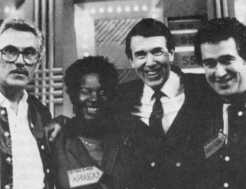 Producer William G. Stewart (left) and presenter Leslie Crowther (second from right) with contestants
Producer William G. Stewart (left) and presenter Leslie Crowther (second from right) with contestantsMichael Crawford and Matthew Kelly were considered as hosts. Central TV wanted a fresher face such as Joe Brown, who Stewart agreed to make a pilot with on the condition that he could also make one with Leslie Crowther.
On the very first TPiR, a woman called Mary Brown was invited to "come on down" but she refused. Producer William G. Stewart wanted to start the new series with a rhyme "Mary Brown, Come on Down!" but clearly it didn't go to plan!
In the Crowther era, the winner actually got their name in the end credits. Which was nice.
No, the Julia Roberts who co-hosted the first two series is not the American actress of the same name. This one later became one of the launch faces for QVC, along with The Weakest Link narrator Jon Briggs.
Following Leslie Crowther's death in 1996, William G. Stewart revealed that Crowther had initially been reluctant to shout 'Come on down!' on the show and had said that he'd need to speak to his wife, Jean, first, in case she didn't approve. Somewhat nonplussed, William G said, "But I'm your producer - she's only your wife", to which Crowther immediately responded, "No - she's my wife - you're only my producer!" Fortunately, Jean did eventually approve and Crowther soon made the catchphrase his own.
When Crowther died in 1996, the next Bruce's Price is Right broadcast was preceded with an announcer saying "Bruce Forsyth would like tonight's programme to be dedicated to the memory of Leslie Crowther".
After seeing the first few episodes, the IBA stepped in to block the Giant Wheel eliminator because they believed it was a pure gamble with no skill involved. This action coincided with an electricians' strike at Central's studios, which took the programme off the air for a month. During the hiatus, and after much head scratching, the producers came up with a game where they had to name the price of an expensive item. The contestant with the answer furthest away from the correct price was eliminated, until two were left for the final. In rehearsals, however, one of the extras pointed out that the final contestant in the row only has to name a price between two he's already heard and he'll always make the final. Therefore, they changed it so that the contestants wrote down the figures first.
During at least two of the Crowther-shows, contestants won inappropriate prizes. One lady won a lawnmower and a set of garden furniture, among other things - and she didn't even have a garden! Crowther's response was, "Well, we'll have to fix you up with one". (Quite how they'd have done that is unclear). On another occasion, a contestant won a car as part of her showcase and then announced that she couldn't drive. Fortunately, just as Crowther was starting to suggest that they might arrange some driving lessons for her, she added, "But my husband can" - no doubt much to the relief of both Crowther and the crew!
On another memorable occasion, a contestant named Maggie made it past Contestants' Row and Crowther soon started calling her 'Giggly Maggie' (his words, not ours - but it's true that she did giggle a fair bit). Her game was 'Secret X', in which she had to price up to three items in order to win a maximum of two X's to place on the board to make a line of three. She managed to price the two items correctly and gain her requisite two X's as well as win the items concerned, but then she demanded to know why she wasn't playing for the third small prize - a swan-design teapot. Crowther explained that she didn't have to play for said teapot, because she'd already priced enough items correctly, but Maggie was having none of it, as she was obviously very taken with the teapot. Crowther exclaimed in mock-despair, "I don't know - she's got all these lovely prizes and now she's on about 'the lickle teapot'" (again, his turn of phrase, not ours). Guess what? They eventually let her keep the teapot.
Bruce once confided to one of the prize researchers that he hadn't heard of one of the Supermarket Game ingredients - creme fraiche - and worried whether the contestants would have done either.
In terms of studios, the show moved around quite a bit. After a year or two, the Crowther version moved over from Central's Birmingham HQ to their Nottingham complex. It was moved back to Brum for the Warman era. Naturally, Brucie's YTV version came to you from Leeds but the Pasquale revival was recorded at Granada's Manchester site, also known as 3SixtyMedia.
As a rather sad coda to the Pasquale era, studio director Phil Chilvers died mid-way through the production of the series. He was found dead in his hotel room, and the crew and audience of 400 waiting in the studio were sent home.
The last episode of Bruce's first series had to wait an entire year for transmission on 27 December 1996, which was after the second series had its full run, not only that, their sponsorship in the first series The Sun, was removed for that episode only because of an expired contract.
The final 3 episodes of the Forsyth era were never shown until game show channel Challenge aired them in 2002.
Merchandise
A board game of the Leslie Crowther version was made.
A Bruce's Price is Right board game was made.
Theme music
1984-88: Paul Maguire, credited as "Musical Director".
1989-90: The original American theme by Edd Kalehoff and Score Productions. Kalehoff's "come on down" music was also used, as were his "losing horns" for lost games and failed showcase bids.
1995-2001: A saxophone-based arrangement of the Kalehoff theme, also imported from Stateside. The aforementioned "losing horns" were used from 1996 onwards, after a different losing cue was used in 1995.
2006-07: Lawrence Oakley composed a full score.
The 2017 version used a new score, composed by Dan McGrath and Josh Phillips.
Web links
Golden-Road.Net - fan site for the original US version.
Pictures
See also
Weaver's Week reviews: the 2006 and 2017 revivals from the time, and retrospectives of the 1989 and 1984 versions.
Videos
The very first episode.

